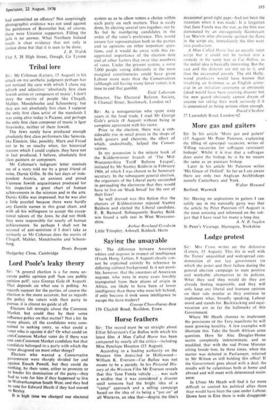Lord Poole's leaky theory
Sir: 'A general election is a far more ac- curate public opinion poll than any public opinion poll', says George Gale (8 August). That depends on what one is polling. As regards support for the parties, of course the election is the more accurate, but as regards the policy the voters wish their party to pursue, it is almost no guide at all.
Electors felt strongly about the Common Market, but could they by their votes influence policy on that matter? Not a bit. In many places, all the candidates were com- mitted to seeking entry, so what could a voter who is against it do? Or what could an anti-Common Market voter do if there was one anti-Common Market candidate but that candidate belonged to a party with which the voter disagreed on most other things? Electors who wanted a Conservative government were sharply divided for and against Enoch Powell, but they could do nothing, by their votes, either to promote or to hinder his domination of the party—they had to vote for him if they happened to live in Wolverhampton South West, and they had to vote for Edward Heath if they had moved to Bexley.
It is high time we changed our electoral system so as to allow voters a choice within each party on such matters. That is easily done, by electing several MPS together, not by Xs but by numbering candidates in the order of the voter's preference. This would ensure fair representation both to the parties and to opinions on other important ques- tions, and it would do away with this ex- aggerated importance of the election date and of other factors that sway tiny numbers of votes. Under the present system, a mere 7,000 people voting differently in the most marginal constituencies could have given Labour more seats than the Conservatives (although still having many fewer votes); it is time to end that gamble.
Enid Lakeman Director, The Electoral Reform Society, 6 Chancel Street, Southwark, London sEl
Sir: As a nonagenarian who spent sixty years in the food trade, I read Mr George Gale's article (8 August) without being in complete agreement with his views.
Prior to the election, there was a con- siderable rise in retail prices in the shops of both grocers and chemists, the effect of which, undoubtedly, helped the Conser- vatives.
In my possession is the minute book of the Kidderminster branch of 'The Mid- Worcestershire Tariff Reform League', initiated by Mr Stanley Baldwin in February 1904. of which I was chosen to be honorary secretary. In the subsequent general election, the organisers of the Liberal party succeeded in persuading the electorate that they would have to live on 'black bread' for the rest of their lives!
So well dressed was this fiction that the electors of Kidderminster rejected Stanley Baldwin and elected the Liberal candidate, E. B. Barnard. Subsequently Stanley Bald- win found a safe seat in West Worcester- shire.
Arthur Rowland Goodwin Little Trimpley, Ashwell. Baldock, Herts






























 Previous page
Previous page